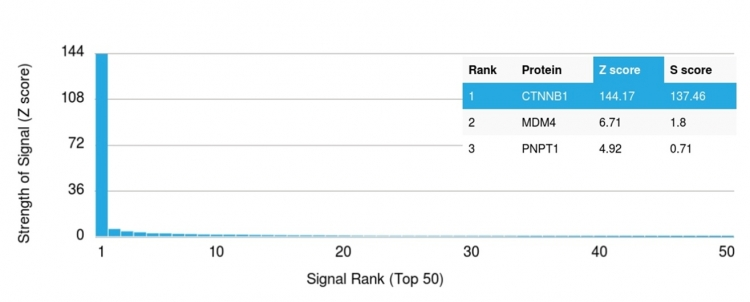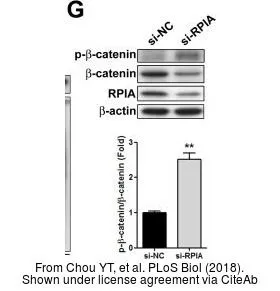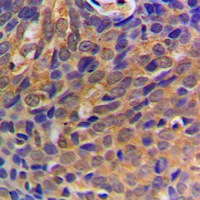![IHC-P analysis of human tonsil tissue using GTX17954 beta Catenin antibody [CTNNB1/2098]. IHC-P analysis of human tonsil tissue using GTX17954 beta Catenin antibody [CTNNB1/2098].](https://www.genetex.com/upload/website/prouct_img/normal/GTX17954/GTX17954_20200115_IHC-P_1276_w_23060620_742.webp)
IHC-P analysis of human tonsil tissue using GTX17954 beta Catenin antibody [CTNNB1/2098].
beta Catenin antibody [CTNNB1/2098]
GTX17954
ApplicationsImmunoHistoChemistry, ImmunoHistoChemistry Paraffin, Other Application
Product group Antibodies
TargetCTNNB1
Overview
- SupplierGeneTex
- Product Namebeta Catenin antibody [CTNNB1/2098]
- Delivery Days Customer9
- Application Supplier NoteIHC-P: 1-2microg/ml for 30 minutes at RT. *Optimal dilutions/concentrations should be determined by the researcher.Not tested in other applications.
- ApplicationsImmunoHistoChemistry, ImmunoHistoChemistry Paraffin, Other Application
- CertificationResearch Use Only
- ClonalityMonoclonal
- Clone IDCTNNB1/2098
- Concentration0.2 mg/ml
- ConjugateUnconjugated
- Gene ID1499
- Target nameCTNNB1
- Target descriptioncatenin beta 1
- Target synonymsCTNNB, EVR7, MRD19, NEDSDV, armadillo, catenin beta-1, catenin (cadherin-associated protein), beta 1, 88kDa
- HostMouse
- IsotypeIgG2b
- Protein IDP35222
- Protein NameCatenin beta-1
- Scientific DescriptionThe protein encoded by this gene is part of a complex of proteins that constitute adherens junctions (AJs). AJs are necessary for the creation and maintenance of epithelial cell layers by regulating cell growth and adhesion between cells. The encoded protein also anchors the actin cytoskeleton and may be responsible for transmitting the contact inhibition signal that causes cells to stop dividing once the epithelial sheet is complete. Finally, this protein binds to the product of the APC gene, which is mutated in adenomatous polyposis of the colon. Mutations in this gene are a cause of colorectal cancer (CRC), pilomatrixoma (PTR), medulloblastoma (MDB), and ovarian cancer. Alternative splicing results in multiple transcript variants. [provided by RefSeq, Aug 2016]
- Storage Instruction-20°C or -80°C,2°C to 8°C
- UNSPSC12352203

![IHC-P analysis of human tonsil tissue using GTX17954 beta Catenin antibody [CTNNB1/2098]. IHC-P analysis of human tonsil tissue using GTX17954 beta Catenin antibody [CTNNB1/2098].](https://www.genetex.com/upload/website/prouct_img/normal/GTX17954/GTX17954_20200115_IHC-P_1277_w_23060620_340.webp)

![FACS analysis of HeLa cells using GTX17706 beta Catenin antibody [CTNNB1/2030R]. Blue : Primary antibody Red : Isotype control](https://www.genetex.com/upload/website/prouct_img/normal/GTX17706/GTX17706_20200115_FACS_186_w_23060620_180.webp)
![ICC/IF analysis of HeLa cells using GTX17731 beta Catenin antibody [rCTNNB1/2173]. Green : Primary antibody Red : nucleus](https://www.genetex.com/upload/website/prouct_img/normal/GTX17731/GTX17731_20200115_ICC-IF_224_w_23060620_546.webp)

